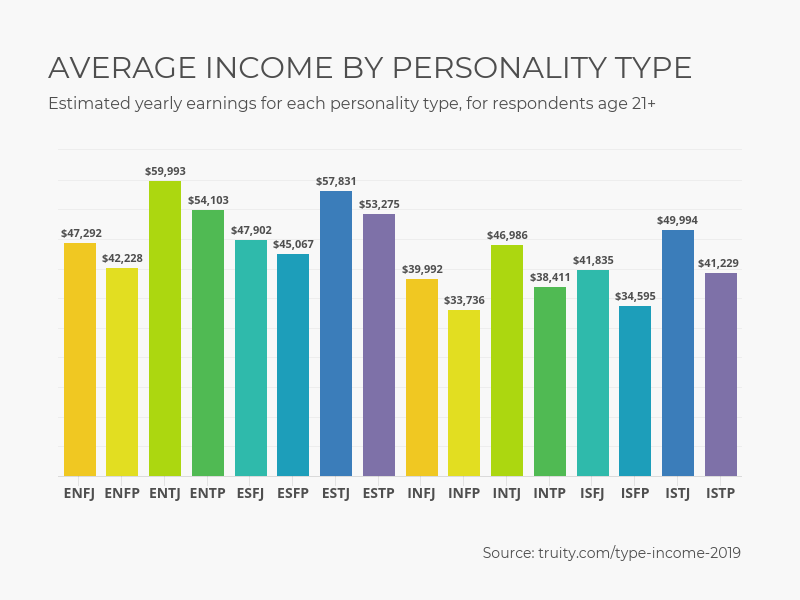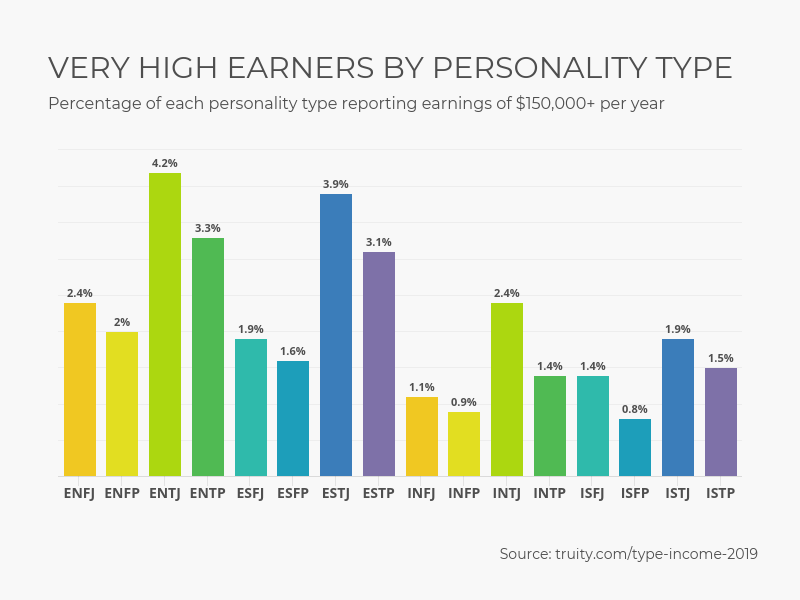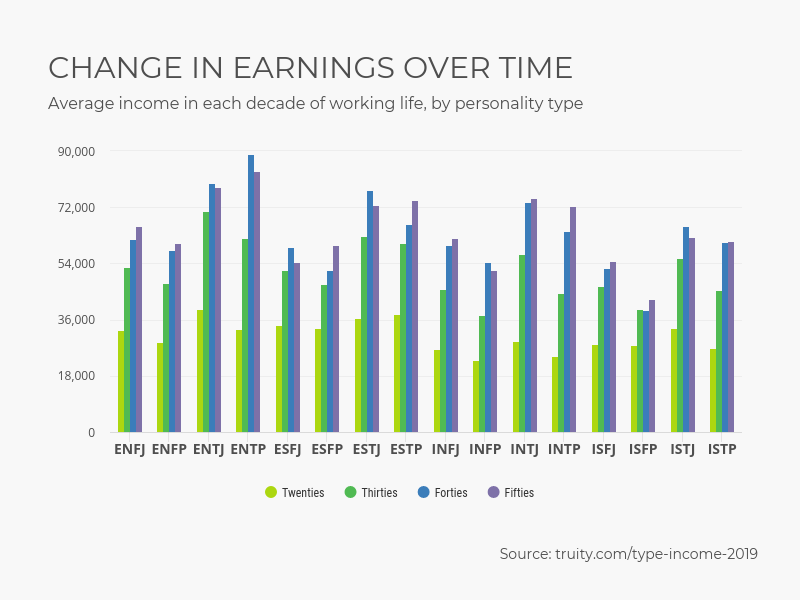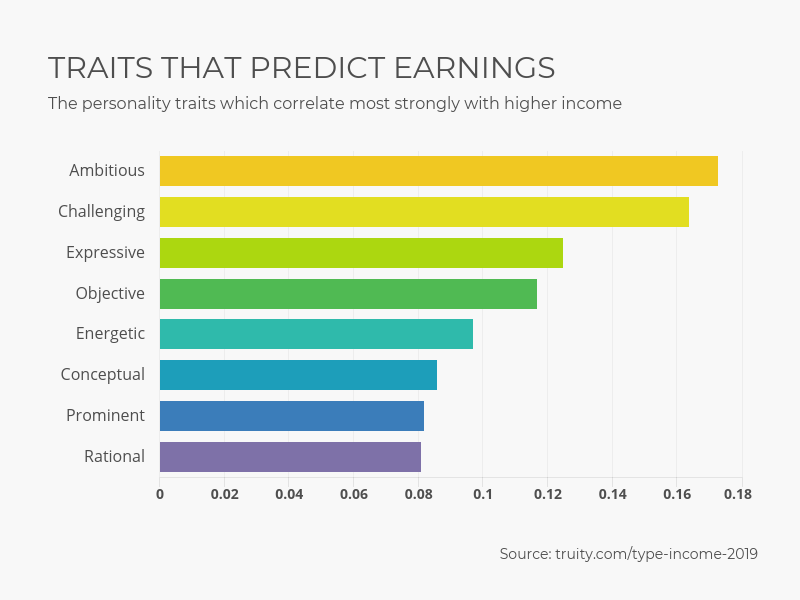
How Your Personality Type Impacts Your Income
You're probably well aware that your income depends on how much education and experience you have. You may have thought about how much more you might earn by moving to a hotter labor market or changing industries. But there's a big piece of your earning power you may be overlooking—your personality type. Those traits you were born with can impact your earnings more than you may expect.
This may not be news to you. In fact, several studies have shown how personality traits can impact your income. If you score highly on extraversion and goal orientation, for example, it's been shown that you may well see more job success and a better salary. However, most of the existing studies are based on the Big Five model of personality, which tends to be less well understood among non-academics. So, we set out to translate these results for those of us who are more familiar with Myers and Briggs' theory of personality type. Would your income potential change depending on which of these 16 personality types describes you best?
Turns out, your type according to Myers and Briggs makes a big difference to your earning potential. In fact, some personality types command a five-figure income premium over others.
A look at our research
We used the TypeFinder® personality assessment to collect personality data and survey 72,331 respondents who volunteered to provide us with information about their income, employment status, and various other career-related data. The TypeFinder measures the four personality preferences developed by Myers and Briggs, as well as 23 unique facets of personality (more about these later).
To analyze the connection between personality type and income, we first estimated an average income for each of the 16 personality types.

As you can see, the differences are dramatic. There was a difference of more than $26,000 between the highest earners (ENTJs, with an average income of $59,993) and the lowest earners (average income of $33,736—sorry, INFPs!). We can see that overall, Extraverted Thinking types appear to earn more.
Looking at the data in a different way, we looked at the percentage of each personality type falling into the category of very high earners ($150,000 USD and up). The Extraverted Thinking types again dominated the ranks of these income powerhouses, along with INTJs.

Income by personality preferences
So why do some types earn more than others? We can gain some insight by looking at the eight personality preferences that make up a personality type. When we break down income by preference, we can see that Extraverts, Thinkers and Judgers have higher income than their counterparts.
In the chart below, you can see that having an Extraverted preference means a major income advantage, with Extraverts commanding a premium of nearly $10,000 a year over their Introverted colleagues. A similar difference exists for Judgers and Perceivers, with Judgers earning about $7,000 more than Perceivers. And Thinkers out-earn Feelers by nearly $8,000 per year.

While these findings might seem startling, they correspond with plenty of academic research based on the Big Five, which has shown an income advantage for people who are more extraverted and have traits that correspond to Myers and Briggs' Judging and Thinking preferences.
How income changes over time
Could the income disparity among types be partly due to the choices they make in their career paths? We know, for example, that Intuitive types are more likely to pursue higher education, while Feeling types (particularly women) may spend more time caring for family than climbing the corporate ladder. It follows, then, that we might see different trends in income over the career lifespan for different personality types.
To investigate this, we looked at average income for each personality type in each decade of a typical working life. We discovered that different personality types do indeed have distinct career arcs.

ENTJs, who tend to be the highest earners overall, start strong: they out-earn all the other types in their twenties and thirties. However, once they reach their 40s, ENTJs’ salaries are eclipsed by late-blooming ENTPs, who are fairly average earners until they reach their stride in middle age and become the highest-earning types of all.
Other late-blooming types include ESTP, INTJ, and INTP, who all tend to earn their highest incomes in their fifties. All four of the Introverted Intuitive types (INFJ, INFP, INTJ, and INTP) were more likely to report that they were spending time on higher education, which might explain why INTJs and INTPs are slow starters in the earnings game.
ESFPs, ISFPs, and ISFJs also have incomes which reach a peak later in life. Digging into the employment status data revealed that these types were much more likely to take time off to care for children in the midst of their earning years.
The personality traits that make the biggest impact
The TypeFinder assessment does not just measure the eight major personality preferences; it also breaks those broader dimensions down into 23 more detailed facets. Each of these facets describes a more specific aspect of a larger preference, allowing the TypeFinder to describe your personality in much more granular detail than a typical personality type assessment.
For example, the dimension of Extraversion breaks down into the facets of:
- Placid vs. Energetic - describes a person's energy level and their preference for being busy
- Private vs. Prominent - indicates a person's preference for privacy versus social status
- Solitary vs. Engaged - shows how sensitive a person is to loud, stimulating environments
- Reserved vs. Expressive - describes a person's readiness to speak their mind
- Calm vs. Joyful - indicates how much positive emotion a person experiences
- Aloof vs. Friendly - describes how apt someone is to approach other people
Because we had access to this detailed facet data, we were able to dive deeper into our analysis of the link between personality and income. We found that some facets were closely linked with income, while others seemed to have little to no effect.

Among the facets of Extraversion/Introversion, the Expressive, Energetic and Prominent styles were most associated with high earnings. Some facets, however, did not correlate: Friendly people had incomes on par with the more Aloof, and Calm and Joyful people earned about the same. This suggests that the income advantage for Extraverts is mostly associated with their aptness to speak up, keep busy, and be comfortable in the spotlight.
The facets of the Sensing/Intuition dimension seemed mostly uncorrelated with income. However, we did find that those with a preference for a Conceptual style had higher incomes. This facet is related to an Intuitive preference and describes the degree to which a person likes to see the big picture and is interested in understanding theories. It's possible that this big-picture outlook may lead to positions with more responsibility, and thus, higher income.
Within the Thinking/Feeling dimension, a few facets seemed to explain most of the income advantage for Thinkers:
- Challenging denotes a person who does not avoid conflict and enjoys debate.
- Objective describes a person who makes decisions based on data and rational arguments, rather than personal concerns.
- Rational indicates a person who prefers to avoid emotional displays, both in themselves and others.
While these three facets of Thinking seemed to boost income, others appeared mostly irrelevant. For example, those who like to cooperate with others earned about the same as those who prefer to strike out alone. We can assume, then, that the income premium for Thinkers has mostly to do with their detached, rational style of behaving and making decisions, as well as their comfort level with conflict.
Within the Perceiving/Judging dimension, one key facet stood out as a relatively strong predictor of high income: Ambitious, which describes a person who sets lofty goals for themselves and is highly driven by achievement. Those who were more laid-back and less goal-driven earned markedly less.
Surprisingly, other facets of Judging showed weaker associations or none at all. An individual’s preferences for being orderly and following a schedule appeared mostly irrelevant to income—an unfortunate surprise to those who have invested a lot of time improving their personal organization skills!
These findings point to the surprising conclusion that ambitious goal-setting appears to be the primary reason that Judgers tend to out-earn Perceivers—more important, even, than persistence or meticulous organization.
Making the most of your earning potential
If you’re an Introverted Perceiver reading these results, fear not—these findings don't mean that you must resign yourself to low wages. These are just statistics, not your destiny. You may well be an INFP who earns a solid six-figure salary. And remember, this research focuses solely on income. We didn’t analyze who was happiest in their jobs!
If you belong to one of the lower-earning personality types, you may be wondering if you should try to change your personality in pursuit of higher income. While our research did point to some concrete behaviors you might mimic for higher earnings—for instance, making an effort to speak your mind, or not shying away from conflict—for the most part, it's smarter to work with your own natural strengths. Research has demonstrated that people whose jobs are a good fit their personality earn a higher income than people who are not so perfectly matched. So you're more likely to maximize your earning power if you're honest about who you are—not to mention, more likely to be happy in your work.
If you're hoping to boost your income, there’s a final takeaway you can focus on: you can shine simply by having the drive to succeed. Our findings show that more so than any other characteristic you might possess, the facet of Ambition is predictive of your earning power. So even if the cosmic personality dice have not rolled in your favor, your high aspirations and lofty goals can help you to make your own luck.
To read more about our research on personality and income, check out the full research report: The Income Effect of Personality Type.











